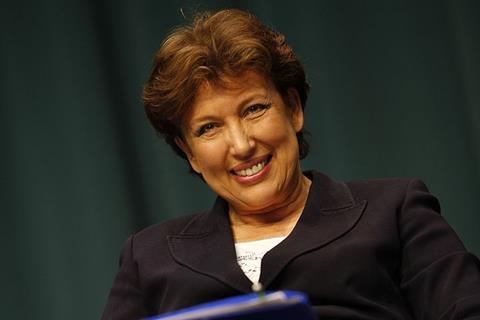
Veteran centre-right politician Roselyne Bachelot has been announced as France’s new minister of culture, becoming the fifth person to take-up the portfolio in five years.
She arrives in the post as the country’s culture sector faces its most challenging period since World War Two due to the Covid-19 pandemic.
According to a recent study by the French culture ministry, revenue for the entire sector has fallen by 25%, or $25bn (€22.3bn), in the wake of the pandemic and national lockdown.
Prior to the outbreak of the virus, the sector was set to generate some $106bn (€92.9bn) in revenues, with an added value of $53bn (€47bn), representing 2.3% of the economy.
The live performing arts are expected to be the most impacted with a 72% drop in revenues, or some $4.7bn (€4.2bn), while the cinema and TV sector is looking at a 20% drop of some $5.4bn (€4.8bn).
Bachelot’s appointment was a surprise for both political pundits and professionals within the cultural sector. Beyond being an avid opera and choral music fan, she has never worked in or overseen policy in the cultural arena.
The appointment was part of a cabinet reshuffle that came in the wake of president Emmanuel Macron’s decision last week to replace his popular prime minister Edouard Philippe with Jean Castex, a technocrat and former civil servant with little public profile.
In spite of her lack of experience in the culture sector, Bachelot is seasoned politician who previously served as a minister of ecology in the government of president Jacques Chirac and then took on the health and solidarity portfolios under the presidency of Nicolas Sarkozy.
She is best known as having been at the forefront of France’s campaign to combat the deadly H1N1 flu virus in 2009 as then health minister. She was criticised in the aftermath for ordering too much vaccine but the Covid-19 pandemic has cast fresh light on her approach.
Challenges
Bachelot’s first task in her new role will be to get the country’s cultural sector back on its feet.
The French government has set aside $5.6bn (€5bn) for the culture sector, just under three times the $1.9bn (£1.57bn) rescue package announced by Boris Johnson’s government for the UK culture sector on Sunday (July 5).
Measures aimed at the cinema and TV world include the creation of the world’s first state-backed guarantee fund for productions as they returned to set, loans for hard-hit companies and emergency income support measures for cultural sector professionals on temporary contracts whose work has been impacted, which are due to last until August 2021.
Bachelot replaces Franck Riester who was appointed to the role in October 2018. A media and culture specialist with expertise in audiovisual leglislation, he was seen as an ideal candidate to pilot the overdue overhaul of the country’s audiovisual laws to fit the digital age.
One of the aims is to create a level playing field for local and global companies operating in France so that platforms such as Netflix will become subject to the same funding obligations, content rights and media windows as domestic players, regardless of where they are based.
The process, which is likely to involve protracted negotiations with professional bodies and companies across the production and distribution chain, had been scheduled to go into a final decisive phase this spring, just as coronavirus struck and a new timetable has yet to the set.
Bachelot is the third person to be appointed to the role of culture minister under Macron’s presidency after Riester who in turn replaced Françoise Nyssen, who held the post for 17 months.
Professionals in the French cultural sector have expressed frustration at the high turnover of ministers in recent years, some pointing to the fact that in neighbouring Germany the same culture minister - Monika Grütter - has been in place for seven years.
Prior to Macron, president François Hollande also went through three ministers in the shape of Aurélie Filippetti (2012), Fleur Pellerin (2014) and Audrey Azoulay (2016).
In an editorial In Le Monde newspaper over the weekend, Olivier Py, head of the prestigious Festival d’Avignon, complained about Macron’s track record vis-à-vis culture and said the role of the culture minister had been downgraded under his presidency by expanding responsibilities and falling state budgets for the sector.

























No comments yet